|
0:00-0:15 Incidental. Descending clarinet solo followed by active strings. Leia: “Find a new base.”
0:15-0:49 Ren's Power motive as The First Order arrives, tracked through hyperspace There appears to be some major editing in this track because there are discrepancies between the film and the soundtrack. In the film, the desperation motive is heard between the arrival of The First Order and the Resistance March below. That appears to have been edited in from another part of the music as it's absent from the soundtrack. 0:49-0:59 Resistance March (strings, d minor) as resistance scrambles a defense. 0:59-1:22 Resistance March (brass, E-flat minor). This was not used in the film as far as I can tell. 1:22-1:42 Desperation motive. This was used in the film. 1:42-1:46 Ren's Power motive, trombone. Omitted from film. 1:46-1:50 Ren's Power motive, horn. Included in film. 1:50-2:04 Incidental. 2:05-2:15 Leia's theme, D-flat major, horn, 1st phrase only More editing here - a LOT more: In the film, there's a prominent ascending then descending triplet line in the trumpets, but it's not heard on the soundtrack. I wonder where that came from...? Also, in the film, Ren's power motive is again heard fortissimo by horns just before Ren doesn't fire on Leia. But that's not heard in the soundtrack. I suspect in this case, the editors copy/pasted from 1:46. And finally, in the film, the first phrase of Leia's theme is heard in the strings in between Ren's power motive and the pause as Ren hesitates. Again, that's missing from the soundtrack. 2:15-2:23 Incidental 2:23-2:34 Orchestral crescendo leading to dramatic pause as Ren hesitates shooting Leia. In the film, this sequence took a few minutes as we see Ren hesitate, then his colleagues fire anyway, the bridge explodes, and we see Leia sucked out of the ship into empty space. But in the soundtrack it's much faster. 2:34-2:56 Leia's theme (piano? harp? both? I can't quite tell), 1st & 3rd phrases, as Leia saves herself. 2:56-3:06 Force theme, C# minor, strings, 1st phrase only 3:06-3:29 Leia's theme, strings with horn answers, E Major 3:29-3:35 Force theme, first phrase, horn, e minor, as Leia is safe 3:35-3:44 Incidental 3:443:58 Rey's melody, quietly and slowly by harp, 1st and 2nd phrases elided, as Leia drops Rey's beacon and Finn picks it up.
0 Comments
0:00-0:08 incidental
0:08-0:38 Low male voices for Snoke. This is also reprised from The Force Awakens, but I'm not sure I can call it a “theme”. 0:38-0:49 Low, scratchy viola as we see Ren approach Snoke 0:49-1:12 Wannabe motive x2 by horn. Snoke: “When I found you...” 1:12-1:20 Imperial March. Snoke: “A new Vader. … I was mistaken.” 1:20-1:31 incidental 1:31-1:38 Brooding motive, bass clarinet 1:38-1:43 Power motive x1, muted trombone, e minor, as Ren takes off his mask. 1:43-2:06 incidental music leads to orchestral crescendo. Snoke: “You fail!” 2:06-2:22 more incidental music 2:22-2:30 low voices again 2:30-2:41 brooding, x2, cellos 2:41-2:57 brooding continues, wannabe superimposed. Snoke: “You're no Vader, just a child.” 2:57-3:17 Power motive, horn, x2 as Ren smashes his helmet 3:08-3:17 incidental 3:16-3:27 wannabe, horn 0:00-0:50 meandering rendition of Jedi Steps, cellos, G minor
0:51 Orchestral crescendo to silence just before Luke tosses the saber 0:52-1:48 incidental music is mixed with Jedi Steps as Rey retrieves the saber and we see porgs for the first time. In the film, this track was split in two: the begging through 1:48, and 1:48 to the end. In between is Snoke's “When I found you...” monologue, which corresponds to track three from the soundtrack. 1:48-2:02 Force theme, C# minor, 1st and 2nd phrases, horn. Rey: “We need Luke Skywalker.” 2:02-2:44 Incidental 2:44-2:56 Rey's theme, D minor, 1st and 2nd phrases, strings. Luke: “Go away.” 2:56 Sarabande, A minor, 1st and 2nd phrases, horn. Luke drinks milk. 3:18-3:26 Crying motive, horn 3:26-3:30 incidental 3:30 key change from A minor to B-flat minor 3:30-3:34 incidental 3:34-3:44 last-ditch fanfare, 1st and 2nd phrases, trumpet, Luke goes fishing 3:44-3:53 last-ditch fanfare, 1st phrase only, flutes 3:53-4:12 sarabande, 1st and 2nd phrases, A minor, brass lead. Luke: “You're wasting your time.” Track 01 – Main Titles and Escape
0:00-1:27 The B-flat major main title during the opening crawl is the same as every episode. 1:28-1:36 The brief, meandering piccolo solo is identical to A New Hope. 1:36-1:37 The rhythmic ostinato is very similar to that used in A New Hope. 1:37-1:58 Incidental music as we see the resistance evacuating their base. 1:58-2:06 Two fortissimo renditions of Ren's motive in the horns. This corresponds to the arrival of the star destroyers. Leia: “Oh no!” 2:06-2:18 A meandering iteration of Ren's brooding motive in the low strings as General Hux says “We've caught them in the middle of evacuating.” 2:18-2:41 Incidental music as Poe and Hux have their “can you hear me now” conversation. Hux: “No terms, no surrender.” 2:41-2:46 Rebel fanfare in A Major as the star destroyer starts firing on Poe. 2:46-3:02 Incidental music as TIE fighters are released and the star destroyer fires on resistance base. Like all the Star Wars films, The Last Jedi soundtrack differs significantly from the music actually heard in the film – and this is the first such instance. In the movie, the main theme is heard just after the star destroyer fires on the resistance base and right before Poe disobeys Leia's order, but that is absent from the soundtrack. Immediately following, Poe's theme is heard in the film but not in the soundtrack. Both instance beg the question: If not written for The Last Jedi, from where does this music originate? Obviously Poe's theme has to come from The Force Awakens (no other film uses that theme), but what about the main theme? That could come from any of the previous films. But I won't be able to positively identify it until The Last Jedi is released on DVD and I can compare side-by-side excerpts. 3:02-3:12 The Resistance March is heard as the good guys mount their attack. “Bombers approaching.” This is a new triple-meter version of the march – to my knowledge, one not heard in The Force Awakens. And actually, I'm not sure it's heard in The Last Jedi, either. I'll have to wait for my next viewing to confirm, but I believe the Resistance March is only heard once in the film's opening sequence even though it's heard twice in the soundtrack. I *think* the iteration heard on the soundtrack at 3:23 – not this triple-meter version – is what's heard in the film. 3:12-3:18 Incidental 3:18-3:23 Resistance March opening 3:23-3:32 Resistance March in full orchestral and in quadruple meter 3:32-4:35 Incidental 4:35-4:49 Desperation motives (horn x4, woodwinds x4, strings x3) as the destroyer targets the resistance cruiser 4:49-5:02 Incidental 5:02-5:42 Horn calls signify all but one resistance cruiser destroyed 5:42 Dramatic pause following orchestral build up 5:43-6:11 Incidental music. Goes into slow motion as the last bomber pilot kicks the ladder, knocking down the detonator. 6:12 Another dramatic pause as it looks like the pilot didn't catch the detonator as it fell. 6:13-6:35 This sounds a bit like Battle of the Heroes from Revenge of the Sith, but I suspect the similarity is coincidental. If it is Battle of the Heroes, then this is the only prequel theme to be heard in The Last Jedi. 6:35-6:52 Incidental music as she DOES catch the detonator and drops the bombs, destroying the dreadnought. This is pretty glorious and compelling music even though it's incidental rather than thematic. 6:52-6:58 Force theme by strings and horn symbolizes the resistance victory. 6:58-7:25 Incidental music after the battle I saw The Last Jedi for a second time on Tuesday. I took 21 pages of notes (I know, I'm a nerd) on the music and how it relates to the story so I can update my "Music of Star Wars" presentation. Here is a working catalog of all the themes used in the film. Starting tomorrow, I will use this catalog as a reference as I dissect and analyze the soundtrack. Most of the thematic (meaning non-incidental) music reprises themes from previous films. Reprized from A New Hope:
Reprized from The Empire Strikes Back:
Reprized from Return of the Jedi:
Reprized from The Force Awakens:
The Force Awakens implied that the Jedi Steps theme is Luke's theme (there were only two characters in that final scene and Rey already has her music, so it seems reasonable that Jedi Steps is Luke's theme), but The Last Jedi did little to confirm or deny that. We do hear the theme a couple of times, but only at the beginning. If this really is Luke's theme, why don't we hear it throughout the film when we see Luke? It should be heard during Luke's battle with Kylo Ren for sure. So I'm still puzzled as to exactly what this theme means. The March of the Resistance undergoes the most musical development throughout The Last Jedi. It is constantly fragmented, twisted, turned, and pulled in all sorts of directions depending on the narrative function at any given moment. Poe's heroic theme features much less prominently in The Last Jedi than the March of the Resistance. It's still there, but it's much more subtle (I didn't even notice it the first time I saw the film) and doesn't carry the same weight. I'm a bit confused, though, as to why. Poe plays a major role throughout The Last Jedi, so why don't we hear Poe's theme more? Lastly, and perhaps most importantly, notice how Rey's and Ren's themes are plural. It's because both characters have multiple parts to their music. Rey's music has five components:
And Ren's music, though not quite as dense as Rey's, has several component parts, as well:
It's also worth mentioning how most of Rey's music and all of Ren's music is motivic rather than melodic. A motive is a short but memorable musical phrase, where melodies tend to be longer. Rey's chime motive, for example, is two measures long and uses seven notes. Rey's melody, by contrast, lasts for six measures and uses 14 notes. I was expecting (and hoping) for musical development of these brief motives for both Rey and Ren in The Last Jedi. I have to admit I was disappointed when that didn't happen. Nevertheless, music for both characters permeates the film – it's just that they're always more or less the same as what was heard in The Force Awakens. Okay, so there are the themes from The Last Jedi that were reprized from previous episodes. Now for the new themes. The most prominent is Rose's theme, which has two parts:
It rather similar to the opening phrase of the Force theme... ... and to Anakin's theme from The Phantom Menace... … and even to David Newman's theme from the 1999 film Galaxy Quest. I suppose this could mean that Rose is related to the force, or to Anakin (or to Dr. Lazarus!), but I suspect these similarities are little more than coincidence. All of these themes use scale degrees 5-1-2 and most use 3 in their melodies, which is a cliche of western music - there are a great many more themes that use this pattern, far too many to list here. Moving along....
In addition to Rose, there are a few more new themes:
Frankly, I'm not entirely sure what all these new themes mean. I suspect it will become more clear as I continue digesting the soundtrack. If anybody out there has ideas, please comment!
So there are all the themes and motives I gathered from a second viewing of The Last Jedi. It's quite likely that I'll discover more bits of new music as I continue digesting, but I believe these are all the major new contributions to the Star Wars musical universe. Now it's time to turn to the soundtrack specifically. I noticed quite a few discrepancies between the film's soundtrack and the album soundtrack (for example, the soundtrack's finale employs Yoda's theme while the film omits it). The soundtrack consists of 20 tracks. I will endeavor to write 20 more blogs, one per track, over the next month, leading up to my “Music of Star Wars” presentations in January 2018, which will debut new commentary on Episode VIII's music. I attended a Thursday night preview showing of The Last Jedi and bought the soundtrack the following day. So at this point, I've seen the film once and listened to the soundtrack several times. This blog contains my initial reactions to The Last Jedi movie and music. WARNING: Spoilers below. I had high hopes for the new Star Wars film. Rian Johnson, the director, had experience with dark film (including a few episodes of Breaking Bad), so I was expecting something dark and profound, ala The Empire Strikes Back. Honestly, I was a bit disappointed with both the film and the music. WHAT I LIKED ABOUT THE FILM Rey turns out to be nobody. I like that Star Wars is expanding from a Skywalker saga. This truly is taking the story in a new direction. Snoke dies in the second film (as opposed to the third, like everybody was expecting). The humor. Part of the problem with the prequels were that they were always so serious. The Last Jedi does NOT take itself too seriously. Comic relief is in plentiful supply. Leia gets to use the force! I like that this is established, but it's entirely undeveloped and comes out of nowhere. (More on this below.) WHAT I DIDN'T LIKE ABOUT THE FILM Structurally, the film is a mess. Ethan Gach of Kotaku compares the structure of The Last Jedi to video games, in that games often send characters off on side missions tangential to the fundamental objective. He argues that such sidebar endeavors work in video games because the player is actively participating, but that type of structure in a film is less successful because the viewing audience is a witness – rather than participant – and so only passively engaged. Indeed, these plot points could have been better explored in a game or serial format rather than a movie. It's as if the scriptwriters made a list of all the things they wanted to include and forced all of them in whether they contributed to the story there or not. What's up with the porgs? They add nothing to the film – only comic relief, which is already plentiful. And they're all horribly animated – it's as if the special effects creators couldn't be bothered to do a decent job! At least those nuns on Ahchto Island actually looked real. It seems like the porgs are just there to sell toys. Strikes me as Disney commercialism at its less than best. While I like Snoke's earlier-than-anticipated demise, he died with no explanation of where he came from. What's his story? Why did he only come to power after the empire? What was he doing during the rebellion? Why was he hiding? How did he come to seduce Ben Solo? And who are the Knights of Ren? And how did Ben get involved? That was hinted at in The Force Awakens, but nothing came of it in The Last Jedi. I would have much preferred to learn more about Snoke and Ben than watch Finn and Rose head off on a pointless casino excursion. And what about the confrontation between Luke and Ben? Luke thought for the briefest of moments that he would kill Ben, Ben wakes at precisely that moment and attacks Luke in self-defense? Is this really just a big misunderstanding? This type of thing works well in chick flicks; not so much in Star Wars. Finally, there's Leia. She gets blown into space but uses the force to survive and make her way back to the ship. I've often thought Leia's force abilities needed to be explored, and I'm glad to see that finally happening, but this came out of nowhere! And with Carrie Fisher's death, I can't imagine they're going to further explore her force abilities in Episode IX. So not only does this come out of nowhere, but it's also leading nowhere. In which case, was it even worth including? So, while I don't think this is a bad film - it's lightyears ahead of Attack of the Clones - it does feel like a missed opportunity. Johnson had a blank slate - fans would flock to this film regardless of what he did with it - but instead of using that carte blanche to do something truly innovative and groundbreaking, he took the easy way out. There's little, if anything, risk taking - nothing that challenges the viewer. And it's obvious why: money. Adding dozens of epic battles and explosions makes for quite the spectacle and a massive commercial success, but it doesn't necessarily make for a great film. Okay, so there are my initial thoughts on the film as whole. But what about the music specifically? The soundtrack, after all, is my primary interest.
WHAT I DIDN'T LIKE ABOUT THE MUSIC When I was a grad student at the University of Hartford, I took a class called “Music for Theater” in which each student scored a play for the university's theater department. It was the best class I took at UHA. I learned so much – including that some directors are more open to music than others. Whether it's a play or a film, the director is the ultimate authority. What he/she says goes. Some directors want music to play a big role, others don't. And in The Last Jedi, Rian Johnson didn't give John Williams much to work with. I wasn't thrilled with J.J. Abrams' direction on The Force Awakens, but Johnson's direction on The Last Jedi has given me a deeper appreciation for Abrams because Abrams consciously gave Williams ample opportunity for music. Johnson, however, failed miserably at that. So while I find The Last Jedi soundtrack to be slightly disappointing, many of my qualms are more with Johnson than Williams. That being said, I was disappointed with Williams' lack of development of Rey's theme. He admitted one reason he agreed to write another Star Wars score was because “I didn't want anybody else writing music for Daisy Ridley.” Indeed, Rey's music is heard throughout The Last Jedi – but it's not developed the way I had hoped it would be. In my presentation, I cite the concluding music of several films. Darth Vader gets the final musical say in The Empire Strikes Back; Palpatine in The Phantom Menace; the force in The Force Awakens. In The Last Jedi, we hear the force theme leading into the end credits (as was the case in Episode VII) and Rey's melody at the end of the end credits. I'm just not convinced either is appropriate. Vader is the winner of Empire, so it's perfectly appropriate that he gets the final music. Palpatine is the winner of TPM, so it makes sense that Augies' Great Municipal Band is based on Palpatine's Sith theme. And The force awakens at the end of The Force Awakens – that's obviously appropriate. But does the force or Rey come out on top at the end of The Last Jedi? I suppose with Luke's death, Rey is the default highest ranking force user, but that's pretty weak – a passive rather than active ascension for Rey. Perhaps I'm missing something, and if so I'll write subsequent blogs explaining the revelation. WHAT I LIKED ABOUT THE MUSIC There are a few new themes, the only major addition being Rose's Theme. The theme is classic Williams – ultra-romantic sweeping melody with lush orchestration. This is what I'll be adding to my Music of Star Wars presentations starting next month. There are many similarities between Rose's theme and other themes (Anakin's theme, the Force theme, even David Newman's theme from the 1998 film Galaxy Quest), but I'm not entirely sure if those similarities are significant or merely coincidental. I suspect the latter. I'll return to this idea in later blogs. Though Rey's and Ren's themes both lack development, The March of the Resistance is developed quite a bit. I'm eager to continue analyzing to discover the many ways in which this theme is tweaked throughout the film. CONCLUSION The first time I saw Rogue One, I liked the film better than the music. After repeated viewings and listening, I reversed myself: I now think the music is much better than the film. Point is: It's very difficult to critique something – anything – on a first encounter. With that caveat in mind, I will withhold final judgment of The Last Jedi until I can see the film a few more times and digest the soundtrack a bit more. Look for future blog posts as I continue analyzing and understanding the music. With Star Wars, Episode VIII: The Last Jedi just two weeks away, I'm offering my predictions on the film and its music. To be clear: I have not read ANY spoilers and there are none in this blog (I don't know any spoilers, so I can't spoil them!). All the thoughts I'm writing down are my own speculations and there's no guarantee that they're accurate. Prediction #1: Kylo Ren's lightsaber Kylo Ren's lightsaber is particularly peculiar. And it's not because of the cross guard style of emitting three blades (the large primary blade with two smaller blades extending horizontally to protect the hands of the user). Rather, it's the jagged edges of the blades that catch my attention. This is observable in the photo above, but it's much more noticeable in movie clips. In the video below, notice the difference between Ren's constantly flaring blades vs. Rey's (Luke's) solid blade. It's as if Ren's blades are made of flames - constantly rippling - instead of solid. Now, maybe this means nothing - perhaps it's just a lightsaber design and nothing more. It's possible I'm contriving meaning where there is no meaning. But I rather doubt it. Because this is different from EVERY OTHER sith lightsaber seen in the movies (Maul in Episode I, Dooku in Episode II, Sidious in Episode III, Vader in Episodes IV-VI), who all have solid-bladed sabers: I'm guessing the horizontal "mini blades" are merely a distraction. Viewers would have easily picked up on the lack of solid blades had Ren used a non-cross guard lightsaber. But by adding those cross guards, viewer attention is focused on this new style of saber, and so deflected away from the blades themselves. I'm guessing that Ren's lightsaber's lack of solid blades is symbolic of his lack of solid commitment to the dark side. And I strongly suspect this tenet will be a major factor in the upcoming film. Prediction #2: Rey's parents There are, of course, dozens of theories on Rey's parentage:
And my personal favorite: Unfortunately, no matter how this plays out, I imagine a great many people are going to be disappointed.
So here's my guess: Everybody has it backwards. Rey's parents aren't what's important. Rather, her offspring are what's important. Every theory I've read assumes a linear progression of time and so only characters who appear older than Rey can be her parents. That is, of course, entirely logical. But I suspect it's wrong! I'm suggesting that, by implementing time travel into the plot, Rey might actually be the mother of a significant character (Shmi Skywalker? Obi-Wan? Palpatine? Jar Jar?). Frankly, I hope I'm wrong with this prediction because time travel never quite makes sense (too convoluted). But I won't be surprised if time travel is involved in explaining Rey's family situation. Prediction #3: The Music
In my Music of Star Wars presentations, I cite a few examples of organic musical development. The "Luke and Leia" theme, for example, grows organically out of the main theme. And "Augie's Great Municipal Band" at the end of The Phantom Menace grows organically out of the Sith Theme from Return of the Jedi. These relationships help tell the story through music. And I'm betting there will be similarly organic musical development in The Last Jedi with Rey and Ren's themes. I'm not sure of the details in how that will work (how could I be?), but given Williams' previous work, I strongly suspect to find more organic narrative growth in the new soundtrack. In The Force Awakens, Rey's theme is much more prominent, substantial, and developed than Ren's. So I suspect that, although Rey's theme will continue to be developed, Ren's theme will undergo more development since it has more room to grow. Am I right - about any of this? We'll find out in two weeks! The "Dies Irae" theme appears several times in the Star Wars soundtracks: And with Episode VIII's release next month, I strongly suspect we'll hear it again in the new film, which is expected to be considerably darker than The Force Awakens (much like how The Empire Strikes Back and Attack of the Clones - both the middle films of their respective trilogies - were darker than A New Hope or The Phantom Menace). And while pondering the possibility the other day, I stumbled upon that "dies irae" theme hidden in the Star Wars main theme. Notice how the last four notes of the main theme excerpts above are the same pitches as the first four notes of the "dies irae". I have no idea if John Williams did this intentionally or not, but I'm going to cite the similarity every time I do my Music of Star Wars presentation from now on.
And I'll get six chances to do so in the next eight days as I do my Star Wars thing throughout Tampa and Orlando: Sunday, 12 November 2017, 3:00-4:00 p.m. Jimmie B. Keel Regional Library, 2902 W. Bearss Ave, Tampa, FL The Music of Star Wars: A Celebration of John Williams' Film Scores Often called a “space opera”, one aspect of the Star Wars films that helped make them such a pop culture phenomenon was composer John Williams' iconic music. This 60-minute multimedia presentation showcases music from all seven episodes. Monday, 13 November 2017, 6:30-7:30 p.m. SouthShore Regional Library, 15816 Beth Shields Way, Ruskin, FL The Music of Star Wars: A Celebration of John Williams' Film Scores Often called a “space opera”, one aspect of the Star Wars films that helped make them such a pop culture phenomenon was composer John Williams' iconic music. This 60-minute multimedia presentation showcases music from all seven episodes. Tuesday, 14 November 2017, 6:00-7:00 p.m. North Tampa Branch Library, 8916 North Blvd, Tampa, FL The Music of Star Wars: A Celebration of John Williams' Film Scores Often called a “space opera”, one aspect of the Star Wars films that helped make them such a pop culture phenomenon was composer John Williams' iconic music. This 60-minute multimedia presentation showcases music from all seven episodes. Wednesday, 15 November 2017, 7:00-8:00 p.m. Jan Kaminis Platt Regional Library, 3910 S Manhattan Ave, Tampa, FL The Music of Star Wars: A Celebration of John Williams' Film Scores Often called a “space opera”, one aspect of the Star Wars films that helped make them such a pop culture phenomenon was composer John Williams' iconic music. This 60-minute multimedia presentation showcases music from all seven episodes. Thursday, 16 November 2017, 6:00-7:00 p.m. New Tampa Regional Library, 10001 Cross Creek Blvd, Tampa, FL The Music of Star Wars: A Celebration of John Williams' Film Scores Often called a “space opera”, one aspect of the Star Wars films that helped make them such a pop culture phenomenon was composer John Williams' iconic music. This 60-minute multimedia presentation showcases music from all seven episodes. Sunday, 19 November 2017, 2:00-3:00 p.m. Orlando Public Library, 101 E. Central Blvd, Orlando, FL The Music of Star Wars: A Celebration of John Williams' Film Scores Often called a “space opera”, one aspect of the Star Wars films that helped make them such a pop culture phenomenon was composer John Williams' iconic music. This 60-minute multimedia presentation showcases music from all seven episodes. Yesterday evening I spoke at the Kanawha County library in Charleston, WV, where I spoke just over a year ago on 10 February 2016.
A few days later, I proceeded south to Mount Airy, NC, where I spoke on 12 February 2016. And I'll be returning tomorrow to deliver The Music of Star Wars. Thursday, 16 March 2017, 6:30-7:30 p.m. Mount Airy Public Library, 145 Rockford St, Mt Airy, NC The Music of Star Wars: A Celebration of John Williams' Film Scores Often called a “space opera”, one aspect of the Star Wars films that helped make them such a pop culture phenomenon was composer John Williams' iconic music. This 60-minute multimedia presentation showcases music from all seven movies. There are two primary aspects I will consider in this review: (1) the film as a whole, and (2) the musical soundtrack. THE FILM First things first: I enjoyed Rogue One. I found the drama and the storytelling compelling, and I'm interested in seeing it in theaters a second time. I've already purchased the soundtrack, and I'll certainly buy the DVD when it comes out. That being said, there were quite a few problems that prevented it from reaching the heights of the original trilogy, The Force Awakens, or even Revenge of the Sith.
Furthermore, the constantly referencing the other Star Wars films (more on this later) makes it difficult to interpret RO as a stand-alone. Now, of course, all of this isn't necessarily “bad”. It's only a problem because the film is trying to be something it's not. It's at odds with itself, resulting in an identity crisis that diminishes the end product. I'm interested to see if/how this perception changes over time and through repeated viewings without those same expectations.
But in Rogue One, Tarkin is deferential to Vader. When the Rebel fleet arrives at Scarif, an underling asks Tarkin for instructions, who defers to Vader's authority. This is a major inconsistency in Rogue One that undermines the Imperial hierarchy displayed in A New Hope and Darth Vader's assumption of authority by The Empire Strikes Back.
RO also referenced the prior films, but they were usually (and thankfully) more subtle about it. The few exceptions where the references were blatant, such as the encounter with Dr. Evazan and Ponda Boba, and the shot of C-3PO and R2-D2 in the hangar on Yavin 4 were completely obvious and gratiuitous. There was one scene in which a blue R2 unit appeared in the background. It subtly served the referential purpose. When I caught it, I thought to myself, “Hey, that could be R2-D2!” But that delicacy was lost a few moments later when the droid tandem made an explicit appearance. This “obvious over subtle” aesthetic distracted rather than contributed to the movie.
As a film, I'll give it a 6 out of 10: solid but not extraordinary. THE MUSIC While the Main Theme and Force Theme are used on occasion, the majority of the music in Rogue One is original. So far I've listened to the soundtrack straight through four times, plus dozens of individual track listens and the viewing itself. So far I've been able to identify four themes:
It uses almost identical pitch material as Williams' "evil motive" from Attack of the Clones... ... which in turn is modeled after the Dies Irae theme.
The opening ascending perfect fifth is a clear nod to the SW Main Theme, as is the climatic high tonic note (in this case D)
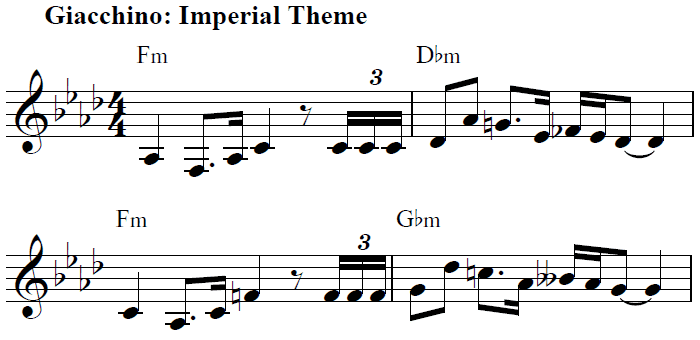 The militaristic character and triplet rhythms are clearly modeled after “Imperial March”. The first two chords (f minor to db minor, I to bvi) are the same as the iconic chord progression in Vader's theme. Its Soviet-style chromaticism (raised fourth in a minor key) is also strongly reminscent of “The March of the Resistance” from TFA.
This theme features prominently in track 17 of the soundtrack, “Your Father Would Be Proud” (especially starting at 1:25), but I don't recall hearing it anywhere else in the film or soundtrack. Certainly it's not used as much as the themes above. It shares similarities with John Barry's theme for the title character, John Dunbar, in the 1990 film Dances With Wolves. They're extremely similar in character (poignant, nostalgic, melancholy), harmony and rhythm. Michael Giacchino wrote spectacular scores for Up, The Incredibles, Ratatoullie, Zootopia, and Inside Out. But I was skeptical when I discovered he was replacing Alexandre Desplat as composer for Rogue One. G's music for Star Trek and Jurassic World, while adequate, lacked the depth of Williams' film scores. And the same can be said of Rogue One: His score is competent and effective when paired with the film (which, after all, the primary purpose of any film score), but it doesn't stand up to listening on its own the way Williams' music can. It leaves me wondering what JW could have done instead. G is at his best when writing whimsical music – that's a big reason why his music for all those Pixar films are so successful – but he's not as adept at epic sci-fi scores. While I appreciate the film and the music, I will not being adding Rogue One to my Music of Star Wars presentation. As a soundtrack, I'll give it a 5 out of 10: competent but not much more. How do those numbers compare with how I rate the other Star Wars films?
Notice that Rogue One is the first film in which the overall movie is superior to the music.
|
The Music of Star WarsThese posts will help focus and develop my analyses of John Williams' film scores. Archives
December 2019
Categories
All
|













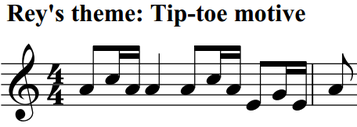





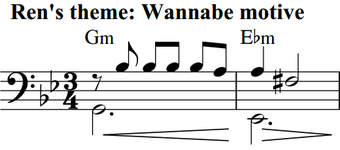


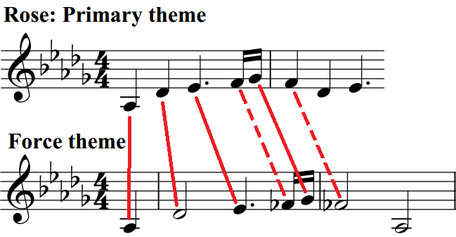
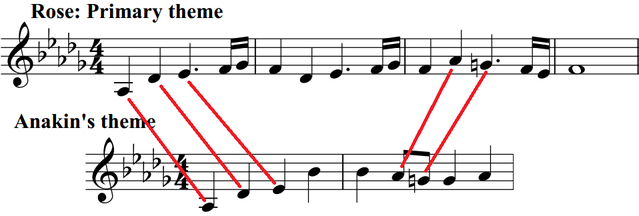
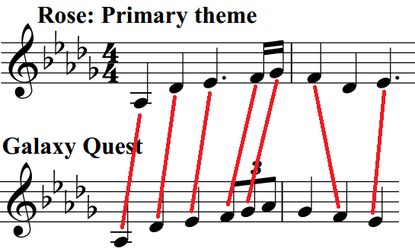



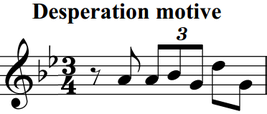

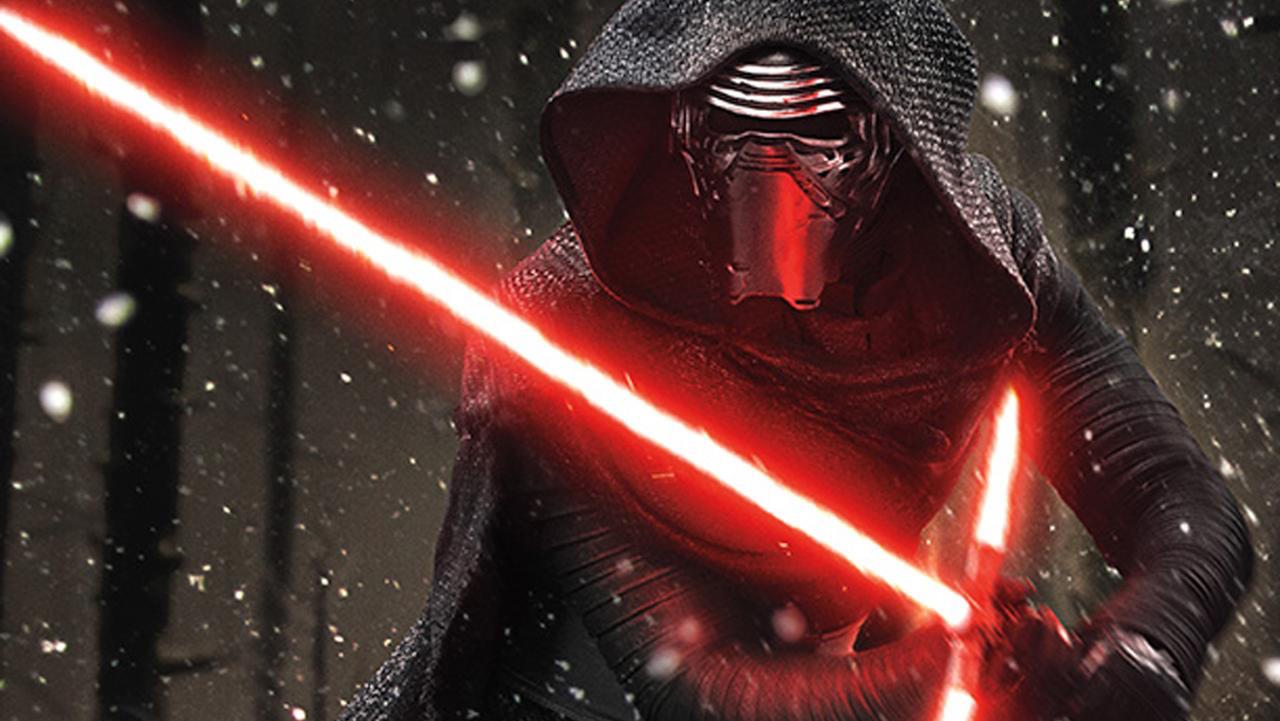
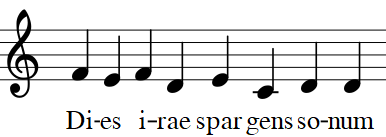


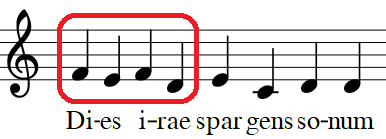


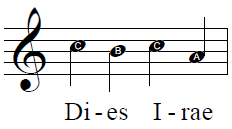


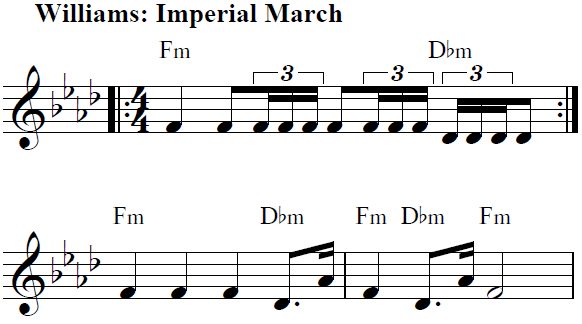

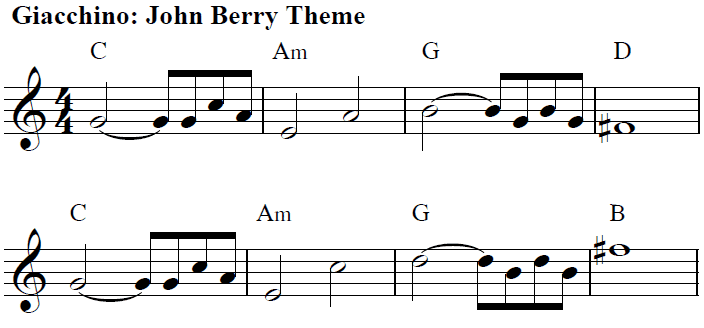
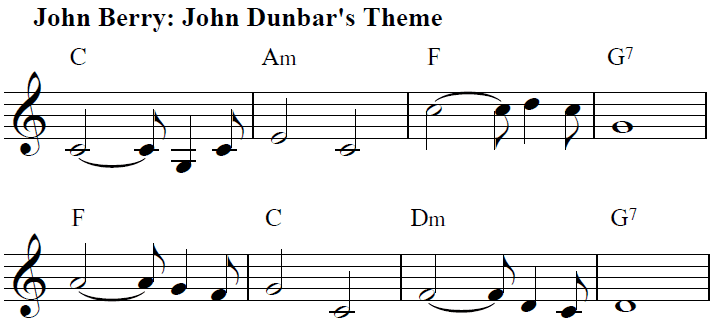
 RSS Feed
RSS Feed
